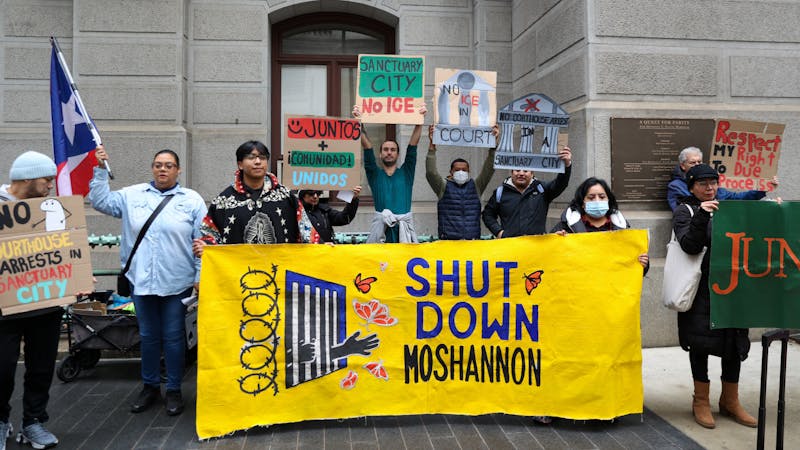Donald Trump (W ‘68) is back in office. For some, it’s a sign of the end of democracy. For others, it’s a long–awaited opportunity to reassert a nationalist agenda. But beyond the polarization—the sensational headlines, partisan battles, and congressional gridlock—there are quieter consequences unfolding in classrooms, dorms, and visa offices.
For international students, Trump’s policies aren’t just a spectacle to watch. Instead, they have tangible impacts and signal a return to a more precarious reality, where visa statuses are as tenuous as ever and Trump’s policies come at the stake of their livelihoods and belonging in the United States.
Since taking office for a second term, Trump has enacted sweeping immigration policies that have had large consequences for international students in the United States. News outlets have widely reported that Trump is planning to implement changes to international travel policies that could affect up to 43 countries. While his anti–immigrant policies have targeted several predominantly Muslim countries, their impact extends to other countries such as Venezuela, North Korea, Russia, and many others.
Beyond travel bans, Trump has also cracked down on immigration enforcement across the country, jeopardizing international students in the process. Mahmoud Khalil, a Palestinian activist and Columbia University graduate student, was arrested by ICE agents and threatened with deportation for his involvement in pro–Palestinian campus protests despite holding a green card. Ranjani Srinivasan, a 37–year–old Indian national and Fulbright Scholar at Columbia University, had her visa revoked for allegedly being “involved in activities supporting Hamas, a terrorist organization” when she participated in pro–Palestinian demonstrations. She fled to Canada afterwards to avoid further immigration consequences.
Yet, even amid this turmoil, not all international students see Trump’s return to the presidency in the same way. Penn’s international student population, in particular, boasts representation from over 100 countries, with about one in five students possessing home addresses outside of the U.S. Given this diverse international student body, reactions to Trump’s proposals have been anything but uniform. “I don't have any fears or qualms about how it's going to turn out in the future,” Bruno Basner (W '26), a student from Germany and the president of the Assembly of International Students (AIS), says.
Other students, though, stand in stark contrast to Bruno’s sense of security surrounding Trump’s policies. “In terms of the country that I'm from, we are on the higher end of that spectrum of anxiety because it seems we will be heavily affected,” says a student from a country where Trump has sharply restricted visas. They requested anonymity due to concerns that publicly sharing their views could lead to severe consequences.
Much of the media coverage surrounding Trump’s new policies has centered around fear—stories of revoked visas, travel bans, and potential student deportations. While these narratives may reflect the experiences of several international students, they certainly don’t capture the full diversity of perspectives. At Penn, especially, where students hail from all over the world, feelings about Trump’s policies are too complicated to be reduced to a single narrative. In interviews with six Penn students, conflicting perspectives seem to suggest that the impact of these policies on international students is shaped by their personal identity rather than what the policies say on paper.
Notably, among the 43 countries that Trump has imposed travel bans on, there are no East Asian countries, with the exception of North Korea, and no Western European countries.
Bruno is a part of the population of Western European international students. He thinks that it’s still too early in Trump’s presidency to predict the full impact of his proposed policies.
“I personally never really felt any risk, especially being a green card holder. There really is no risk,” says Bruno.
As a green card holder, Bruno is granted permanent lawful residency and is able to both live and work in the United States. But recent examples in the news have shown that there are limits to the security that green card status provides, such as with the arrest and potential deportation of Mahmoud Khalil.
Bruno, however, expresses confidence not only in his legal status but also in Penn’s institutional support. As the president of AIS, he is privy to the behind–the–scenes operations of Penn’s Office of International Student and Scholar Services (ISSS). He says AIS maintains constant communication with ISSS, which has been hosting listening sessions as part of a broader effort to interact with international students, address their concerns, and alleviate lingering anxieties about the Trump administration.
“I'm very surprised at how involved Penn has been with having students lead the discussions and having students be able to voice their concerns,” Bruno says. “It's something that you can very easily take for granted, and it's not something that's at every other university.”
Maggie Zeng (C '28), a student originally from Hong Kong and Canada, both of which are not listed in one of Trump’s 43 countries that have been travel–banned, echoes Bruno’s concerns about the uncertainty surrounding the feasibility of Trump’s policy proposals.
“I feel like I'm part of the very privileged [number] of people who don't feel like I am personally threatened a lot by his policies or his threats,” Maggie says.
Maggie is also uncertain about the true extent of Trump’s power. “I don't think he has the executive power to say you're gonna get deported if you don't agree with him,” Maggie adds. “At least, I hope not. To my understanding, he doesn't have that executive power, but there's just a lot of anxiety going around with what he's about to do because we all know that he's very spontaneous with his decision making.”
That anxiety has certainly grown in recent weeks. On March 24, The New York Times reported that Yunseo Chung, a Columbia University student and legal permanent resident, was threatened with deportation by the Trump administration because of her participation in a pro–Palestinian protest. Yunseo had lived in the United States since she was a child, having moved from South Korea at the age of seven.
Trump’s spontaneous decision–making has also come to light following other developments, such as his invocation of the 18th Century Alien Enemies Act to expedite the detention and deportation of individuals suspected of being affiliated with the Venezuelan gang Tren de Aragua. Critics have raised concerns about the lack of evidence that was used to justify some of the detentions, pointing to a case where a Venezuelan immigrant was targeted based on his tattoos and attendance at a party in a Federal Boulevard warehouse.
While rarely invoked in modern times, the law has been used previously during World War I and World War II to justify the detention of non–citizens from enemy nations, such as to place thousands of Japanese Americans into Camp Amache, an internment camp, during World War II. Its revival today sets a dangerous precedent where immigration enforcement can seemingly be justified through mere suspicion rather than incriminating evidence.
Eujiny Cho (C’28), a student from South Korea, has also found herself grappling with the unpredictability of Trump’s actions. Eujiny admits that she feels “pretty privileged” since her country of origin, South Korea, hasn’t been targeted by the Trump administration. She also recognizes that people from other countries are going through “pretty horrible things,” pointing out how the Trump administration has specifically targeted countries with a Muslim–majority population. However, she says that she still can feel the effects of his actions on the broader political climate.
“If there's anything, Trump has shown that he kind of just does whatever he wants,” Eujiny says. “No one really knows how far he's gonna go, how much he's actually gonna carry out what he says.”
A student from the country where Trump has sharply restricted visas—who requested anonymity due to concerns that publicly sharing her views could lead to severe consequences—offers a much stronger reaction compared to those of Bruno, Maggie, and Eujiny.
The student explained that their current reality, solely because of their country of origin, has been directly shaped by regulations enforced by the Trump administration. Because of Trump’s travel ban, they have abandoned their original plans to return to their home country. “I was hoping to apply for my mom's visa, but it seems that now, with the travel ban, visas for [my country] will be sharply restricted. So I think that might be an issue,” the student says.
The student also expressed disappointment at how Trump is targeting mainly Muslim–majority countries. “Countries like Germany were not even on the list. They're not even in consideration, you know?” the student says.
Trump’s immigration policies are also casting doubt on the plans of many of Penn’s international students who hoped to work in the United States after graduating from college.
On Feb. 7, the National Institutes of Health (NIH) implemented a funding cut—a 15% cap on indirect costs, which includes funding for overhead research costs such as lab spaces and support staff—that would cause Penn to lose $240 million. However, after Penn and 12 other universities brought a lawsuit against the NIH, the judge was able to temporarily halt the changes.
As a researcher for Penn Medicine and a student planning on going to medical school, Maggie says that these potential funding cuts have impacted her view on her place in the United States more than the immigration policies have.
“The plan all along was I wanted to go to med school, and I would apply here, and I would also apply to Canada,” Maggie says. “Would it be good for me to stay here?”
Eujiny, like Maggie, also explained that the recent policies have made her reconsider her desire to remain in the United States after college. Her sister is currently in law school in the United States, and Eujiny has seen how stressed her sister is about procuring an H–1B visa—the visa for non–immigrants that allows U.S. employers to temporarily hire foreign workers in specialty occupations for a maximum of six years, typically requiring a bachelor’s degree or equivalent.
“It definitely has made me a bit more concerned as to if I can stay for an extended period of time after my undergrad, if I want to do a Master’s or go straight into the workforce, and if I can have a stable position,” Eujiny says.
Another Penn undergraduate student, who asked to go by the initials F.J. due to fear of deportation, originally planned to pursue a PhD after graduation. Now, F.J. is afraid it may no longer be a possibility due to “[cuts in] funding resources and censorship” and says that they are considering moving to Europe depending on how Trump’s policies play out.
Beyond its undergraduate population, Penn is also home to a large number of graduate students. In 2024, there were 13,722 full–time graduate or professional students at Penn. Among them is Will Yu, a graduate student studying philosophy at Penn. Will says that the anxiety and fear experienced by an international graduate or PhD student under Trump’s policy changes are unparalleled, especially since the visa status of a PhD student is closely tied to their employment.
PhD students normally receive stipends that cover enrollment fees in exchange for working, which comes in the form of teaching or research assistantships. Teaching assistant positions are common for those in liberal arts fields and include leading undergraduate courses, while research assistant positions are more exclusive to those studying STEM and require students to actively partake in lab research. Will explains that for international graduate students conducting lab–based research, being stuck abroad due to Trump’s travel ban could lead to losing their stipend. Since principal investigators or other project leads often won’t pay students who aren’t physically present to work, even a short delay in returning to campus could result in termination from their positions.
While the future of international graduate students may be in jeopardy, Will doesn’t think that the same applies to international undergraduate students. Penn—like several other universities in the nation, with the exception of Amherst College, Bowdoin College, Dartmouth College, Harvard University, Massachusetts Institute of Technology, Princeton University, and Yale University—is need–aware for international undergraduate applicants that are not permanent residents of the United States, Mexico, or Canada, which Will believes is a policy that makes international undergraduate students more financially desirable.
International students contribute billions of dollars to universities and the U.S. economy per year. According to Forbes, in 2015, the U.S.’s public universities obtained more than $9 billion in tuition and fees from foreign students, accounting for approximately 28% of their annual tuition revenue. Private institutions are no exception when it comes to enrolling large numbers of international students, though data is often harder to access, and tuition costs tend to be more consistent across students regardless of financial need. According to The World, international students contribute $40 billion to the economy annually, with most of them paying the full cost of college tuition. It’s no surprise that colleges, such as Penn, might view international students as a vital financial resource.
As a result, PhD students, who don’t pay for any tuition, are some of the first to go amidst the federal funding cuts imposed by the Trump administration. At Penn, professors were informed to cut admissions rates for their undergraduate programs, and some even had to rescind decisions from students they thought were already accepted.
“International graduate students are extra expensive. I mean, all the graduate students are expensive. International graduate students are even more expensive,” Will says.
Beyond concerns about post–graduation employment, international students who are politically active face even greater risks under Trump’s administration.
As a graduate student union organizer for GETUP–UAW, Will is politically active but says that the recent policy changes have created a stressful environment. “People who just practice their constitutionally protected First Amendment rights of their own speech could be prosecuted and kicked out of the country and lose their chance to study here,” Will says.
“We have seen that [...] your First Amendment rights aren’t going to be protected even if you're a green card holder, right? So it does open the possibility of, what about other kinds of rights?” Will adds.
The student from the country where Trump has sharply restricted visas says that though they originally desired to be more politically active at Penn, especially in pro–Palestinian protests, fear of retaliation from the Trump administration hindered them from doing so.
“We don't want to be deported because there were arrests being made right around the time that there were protests. If we do get arrested, that would be a big issue for us,” the student says.
Even small things like social media can alert ICE agents. Earlier this month, the Trump administration proposed collecting the social media handles of applicants for naturalization, permanent residence, and asylum—an expansion of a policy that currently applies to non–immigrant and immigrant visa applicants. F.J. says that since Trump has returned to office, she has become wary of expressing any political views that can be traced back to her.
“I feel like also because [international students are] being deported, I have also reduced my political activities because they were mainly through social media,” F.J. says. “I was just like, ‘Oh, I'm not gonna like this,’ because maybe the U.S. embassy is going to look at this because one of the key components of applying for a US visa is that they require your social media.”
Concerns about visa security and immigration have long existed before the Trump administration, but recent crackdowns on travel, student visas, and political expression have only intensified the anxieties and uncertainties of those who have built their lives in the United States. Immigration policies have increasingly become a political battleground, and the individuals whose lives are at stake are seemingly used as pawns.
As rallies erupt on campuses across the country—especially at Penn, which has been the center of several pro–Palestinian and graduate student union protests—international students find themselves in a precarious position. For many, participation is not just about expressing political views but also requires them to consider their nationality and visa status. The instability of immigration policy is being weaponized against students with legal status who choose to take political action. But this notion of safety is an illusion that can easily be destabilized given the current sociopolitical climate.
The United States is in a rough spot, yet many international students still wish to remain here.
“I do want to stay, I do want to work, but [Trump’s policies] have affected whether or not I would be able to do it, and whether or not I'm thinking about my backup options and just being really cautious,” the anonymous student says.
With restrictions continuing to tighten, universities are navigating their roles in supporting students who aren’t citizens of the United States. Even if non–citizens are allowed to remain in the United States, it is inevitable that their voices will be stifled due to their precarious immigration status. Trump’s new policies have the potential to censor international students who have played an important role in contributing to the diversity of perspectives that make Penn what it is.





